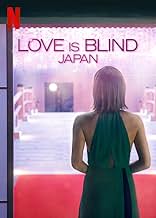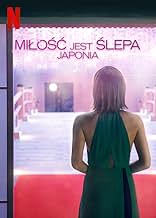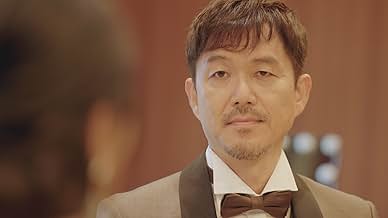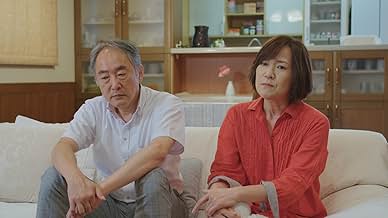ÉVALUATION IMDb
7,0/10
1,1 k
MA NOTE
Dans cette série de téléréalité, des célibataires japonais qui rêvent de mariage se rencontrent, se séduisent et se fiancent… avant même de s'être vus.Dans cette série de téléréalité, des célibataires japonais qui rêvent de mariage se rencontrent, se séduisent et se fiancent… avant même de s'être vus.Dans cette série de téléréalité, des célibataires japonais qui rêvent de mariage se rencontrent, se séduisent et se fiancent… avant même de s'être vus.
Parcourir les épisodes
Avis en vedette
I'm really enjoying this show. After watching the American version, with a number of backstabbing/egocentric people, it's refreshing to witness a culture in which the participants are respectful and supportive of each other--even when they have differences.
Watching this has given me insight into Japanese culture.
PS Having just watched the final episodes, I raised my rating from 8 stars to 9. The kindness and respect between couples and families is amazing and enlightening.
Watching this has given me insight into Japanese culture.
PS Having just watched the final episodes, I raised my rating from 8 stars to 9. The kindness and respect between couples and families is amazing and enlightening.
Everyone come from all walks of life. There is no perfect Prince Charming or princess. Everyone has their flaws and definitely their own charms. It is a really interesting and diversified show.
I love cultural diversity so it's a gift to see "Love is Blind" in different cultures. I was happy to see some of the cultural differences in the Japanese series and would have loved to see more
for example traditional clothing. It was interesting to see how the couples communicate especially when engaging in a serious conversation. It was also neat to see how there was an important focus on being respectful in this culture. At times the show was a bit dry and slow but then would grab my attention and pull me back in. I felt like a few women were more focused on promoting their talents on the show than falling in love. Some of the overdubs were awful, especially the one that sounded like a little girl. This was especially creepy because under the overdue you can hear that she has a deeper adult voice. Overall I enjoyed this season of Love is Blind Japan.
I really enjoyed this series. As an American that has never been to Japan, I found it even more interesting to learn about the culture and how the contestants went about dating. The contestants led with their brain instead of their heart which is typically seen in American dating shows. I also enjoyed seeing the places that they visited for the getaway and the apartments that they lived in leading up to the wedding. Plus their budget is huge as shown by the design for the pods, living quarters, the flower filled bridge for where the couple meets if they get engaged and the hotel for the getaway!
The contestants took the experience seriously especially when compared to those on the American version. Although some of the contestants fell for the same person, there wasn't any animosity or drama over it. There were no cat fights and both the male and female groups provided a sense of support for one another. This show was filled with love and you can't but hope that everyone finds someone.
I liked that the couples who did get "married" or just walked down the aisle showed that it is possible to fall in love without seeing the other first. I enjoyed hearing about their reservations before the wedding and how they worked on them as a couple. All of the couples took the dating process more seriously and that is shown in the types of conversations that they had on the dates.
The contestants took the experience seriously especially when compared to those on the American version. Although some of the contestants fell for the same person, there wasn't any animosity or drama over it. There were no cat fights and both the male and female groups provided a sense of support for one another. This show was filled with love and you can't but hope that everyone finds someone.
I liked that the couples who did get "married" or just walked down the aisle showed that it is possible to fall in love without seeing the other first. I enjoyed hearing about their reservations before the wedding and how they worked on them as a couple. All of the couples took the dating process more seriously and that is shown in the types of conversations that they had on the dates.
I was really interested to see how this show would translate to a culture where people don't open up so easily, and I was really pleasantly surprised. By the end of the show I felt my time was well spent exploring the concerns about relationships between contestants and partners, and it made me reflect on my own life as well. This is a rare quality for reality tv.
Good points: -The producers focus on the human emotions and experience, not the drama. This is what reality tv should be like!! The US version feels so drama-focused it feels like it's scripted at times, but the Japan version feels natural. Yet even though, there are still tons of surprises and tension in the Japan version. The stakes almost feel higher in the Japan version as well.
-Culturally, Japan takes match making much more serious than the US, so the contestants are on the show for love, not to become influencers like the US version. Even towards the end everyone isn't forced to wait until the altar to say "yes/no" in a performative way. This makes the show feel genuine, creates unexpected moments, and makes you even more invested in seeing the success of certain relationships.
-The budget is really high. So much higher than the US version, so it doesn't feel like any other cheap reality show. For example, they stay at Hosinoya Resort in Okinawa, one of the most luxurious resorts in Japan. They also dine in several high class restaurants. This will allow overseas viewers to see a different side of Japan.
-The aesthetic is on point. They clearly brought in designers to create pods that are creative, sophisticated, and more interactive than the US version via little doors that fit seamlessly in the design where contestants can exchange items. This makes the experience more personable for contestants. Also, the area where the contestants meet for the first time is very romantic and uniquely Japan with flowers hanging down and a bridge over water; much more magical than the US's red carpet.
-The music pairings are good.
-The producers didn't try to incite jealousy by forcing contestants to have conversations about other people they had crushes on. The US version does this too often.
-There is a lot of diversity in the cast despite being a Japan-focused show culturally, ethnically, and socio-economically. I hope this can open viewers' eyes to see Japan is a lot more complex than just 'Japanese'.
-Great title screen shots and locations to showcase Tokyo and other parts of Japan. It ties in the metropolitan feel to the cast.
-The program showcases the struggles and stigma around being a divorced woman in Japan in an empathetic and open-minded way. That is a true accomplishment by the show's producer in a country with such strict stigmas. Well done.
Things to be improved: -The wedding officiant was a random foreigner who spoke English, and most of the contestants and their families don't speak English.. It just felt out of the blue and performative. The venues were beautiful though.
-The producers chose a few famous people, like Kaoru and Priya. I wish in the future they stick with just normal non-famous people, not people who are children of famous actors/entertainers. Even on other shows like Terrace House Japanese producers will choose already famous people, likely so their viewer ratings will be higher.
Overall, I was really impressed for a debut season. It was wholesome, fulfilling, and edge of your seat at the end. Provides a great insight to Japanese dating culture. Highly recommended, and hope they make another season.
Good points: -The producers focus on the human emotions and experience, not the drama. This is what reality tv should be like!! The US version feels so drama-focused it feels like it's scripted at times, but the Japan version feels natural. Yet even though, there are still tons of surprises and tension in the Japan version. The stakes almost feel higher in the Japan version as well.
-Culturally, Japan takes match making much more serious than the US, so the contestants are on the show for love, not to become influencers like the US version. Even towards the end everyone isn't forced to wait until the altar to say "yes/no" in a performative way. This makes the show feel genuine, creates unexpected moments, and makes you even more invested in seeing the success of certain relationships.
-The budget is really high. So much higher than the US version, so it doesn't feel like any other cheap reality show. For example, they stay at Hosinoya Resort in Okinawa, one of the most luxurious resorts in Japan. They also dine in several high class restaurants. This will allow overseas viewers to see a different side of Japan.
-The aesthetic is on point. They clearly brought in designers to create pods that are creative, sophisticated, and more interactive than the US version via little doors that fit seamlessly in the design where contestants can exchange items. This makes the experience more personable for contestants. Also, the area where the contestants meet for the first time is very romantic and uniquely Japan with flowers hanging down and a bridge over water; much more magical than the US's red carpet.
-The music pairings are good.
-The producers didn't try to incite jealousy by forcing contestants to have conversations about other people they had crushes on. The US version does this too often.
-There is a lot of diversity in the cast despite being a Japan-focused show culturally, ethnically, and socio-economically. I hope this can open viewers' eyes to see Japan is a lot more complex than just 'Japanese'.
-Great title screen shots and locations to showcase Tokyo and other parts of Japan. It ties in the metropolitan feel to the cast.
-The program showcases the struggles and stigma around being a divorced woman in Japan in an empathetic and open-minded way. That is a true accomplishment by the show's producer in a country with such strict stigmas. Well done.
Things to be improved: -The wedding officiant was a random foreigner who spoke English, and most of the contestants and their families don't speak English.. It just felt out of the blue and performative. The venues were beautiful though.
-The producers chose a few famous people, like Kaoru and Priya. I wish in the future they stick with just normal non-famous people, not people who are children of famous actors/entertainers. Even on other shows like Terrace House Japanese producers will choose already famous people, likely so their viewer ratings will be higher.
Overall, I was really impressed for a debut season. It was wholesome, fulfilling, and edge of your seat at the end. Provides a great insight to Japanese dating culture. Highly recommended, and hope they make another season.
Le saviez-vous
- AnecdotesContestant Priya is Priya Yoshikawa, who was Miss World Japan in 2016.
Meilleurs choix
Connectez-vous pour évaluer et surveiller les recommandations personnalisées
- How many seasons does Love Is Blind: Japan have?Propulsé par Alexa
Détails
- Date de sortie
- Pays d’origine
- Site officiel
- Langue
- Aussi connu sous le nom de
- Love is Blind: Japan
- Lieux de tournage
- société de production
- Consultez plus de crédits d'entreprise sur IMDbPro
Contribuer à cette page
Suggérer une modification ou ajouter du contenu manquant


























